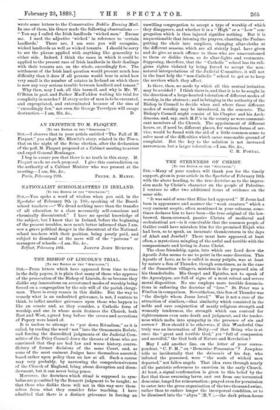THE BISHOP OF LINCOLN'S TRIAL.
[To THE EDITOR OF THE " SPECTATOR."]
Sin,—From letters which have appeared from time to time in the daily papers, it is plain that many of those who approve of the prosecution of the Bishop of Lincoln, do so because they dislike any innovations on accustomed modes of worship being forced on a congregation by the sole will of the parish clergy- man. There is every reason in this dislike. But the way to remedy what is an undoubted grievance, is not, I venture to think, to inflict another grievance upon those who happen to like an ornate and, as they consider, a Catholic form of worship, and one in whose main features the Church, both East and West, agreed long before the errors and accretions of Popery were heard of.
It is useless to attempt to "put down Ritualism," as it is called, by reading the word " not " into the Ornaments Rubric, and forcing the discredited judgments of the Judicial Com- mittee of the Privy Council down the throats of those who are convinced that they are bad law and worse history, contra- dictory of former decisions of the same Court, and, as some of the most eminent Judges have themselves asserted, based rather upon policy than on law at all. Such a course may very probably, by narrowing the comprehensiveness of the Church of England, bring abont disruption and disen- dowment, but it can never bring peace.
Moreover, the doctrines which ritual is supposed to sym- bolise are permitted by the Bennett judgment to be taught; so that those who dislike these will not in this way save them. selves from what they consider false teaching. I have admitted that there is a distinct grievance in forcing an unwilling congregation to accept a type of worship of which they disapprove, and whether it is a "High" or a " Low " con- gregation which is thus injured signifies nothing. But it is unquestionable that intoning the prayers, chanting the Psalms, putting the choir into surplices, changing altar-cloths at the different seasons, which are all strictly legal, have given and do give as much offence to those who are unaccustomed to them or dislike them, as do altar-lights and vestments. Supposing, therefore, that the " Catholic " school has its reli- gious rights violated by being forced to accept the non- natural interpretations of the Judicial Committee, it will not in the least help the " non-Catholic " school to get or to keep the services which they affect.
Is there, then, no mode by which all this mutual irritation may be avoided ? I think there is, and that it is to be sought in the direction of a large-hearted toleration of different modes of worship, in the abstract ; and in bringing in the authority of the Bishop in Council to decide when and where these different modes of worship may be introduced, in the concrete. The Bishop's Council might consist of his Chapter and his Arch- deacons, and, say, such M.P.'s in the county as were communi- cant members of the Church. The appointment of different hours, or, if need be, different places, for various forms of ser- vice, would be found with the aid of a little common-sense to solve most of the difficulties which cause reasonable ground of complaint. But the key to the solution is not increased narrowness, but a larger toleration.—I am, Sir, &c.,
C. R. PORTAL.


































 Previous page
Previous page